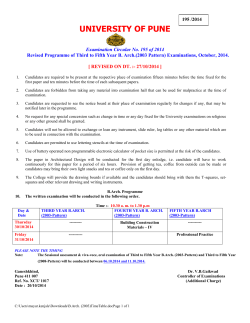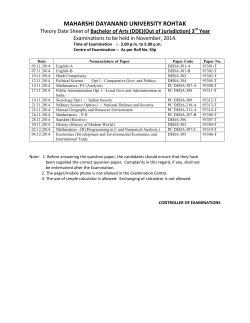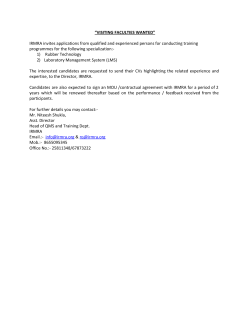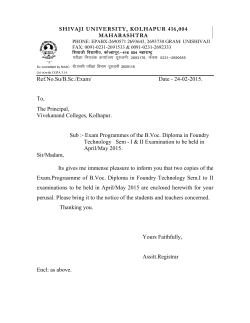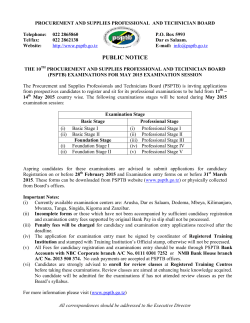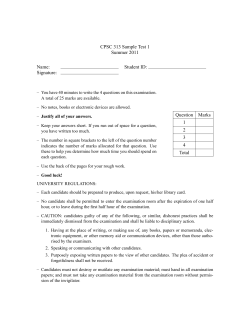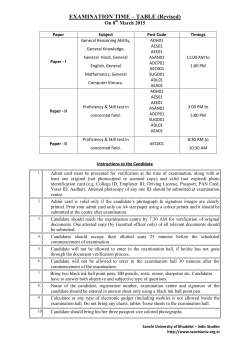
State of Delaware Real Estate Candidate Handbook
PEARSON VUE Quick Reference inside front cover Table of Contents page i Exam Reservations page 3 Exam Day: What to Bring page 6 CLICK HERE FOR CONTENT OUTLINES. Test Center Locations back cover Delaware REAL ESTATE Candidate Handbook May 2015 SEARCH QUICK REFERENCE RESERVATIONS Before making an exam reservation Candidates should thoroughly review this handbook, which contains examination content outlines and important information regarding eligibility and the examination and licensing application process. STATE LICENSING INFORMATION Candidates may contact the Division of Professional Regulation with questions about obtaining or maintaining a license after the examination has been passed. Delaware Real Estate Commission Division of Professional Regulation 861 Silver Lake Boulevard Suite 203 Dover, DE 19904-2467 Phone (302) 744-4500 Web www.dpr.delaware.gov EXAMINATION INFORMATION Candidates may contact Pearson VUE with questions about this handbook or about an upcoming examination. Pearson VUE Delaware Real Estate Attn: Regulatory Program Coordinator 5601 Green Valley Dr. Bloomington, MN 55437 Phone (800) 274-2604 Email pearsonvuecustomerservice@ pearson.com Web www.pearsonvue.com Making an exam reservation Candidates may make a reservation with Pearson VUE by: • Visiting the Pearson VUE website at www.pearsonvue.com • Calling Pearson VUE at (800) 274-2604 Candidates should make a reservation online or by phone at least twenty four (24) hours before the desired examination date, unless an electronic check is used for payment, as detailed on page 4. Walk-in examinations are not available. Candidates who hold a license in another state and wish to apply for a license in Delaware must visit http://www.pearsonvue.com/waivers/derel.asp and follow the instructions. The form must be completed PRIOR to making a reservation request. SCHEDULES & FEES Test centers A list of test centers appears on the back cover of this handbook. Candidates should contact Pearson VUE to confirm specific locations and schedules. Exam fees The examination fee ($85) must be paid at the time of reservation by credit card, debit card, voucher, or electronic check. Payment will not be accepted at the test center. Examination fees are non-refundable and non-transferable. EXAM DAY What to bring to the exam Candidates should bring to the examination proper identification and other materials listed in What to Bring (page 6). Exam procedures Candidates should report to the test center at least thirty (30) minutes before the examination begins. Each candidate will have four (4) hours to complete the examination, and will leave the test center with an official score report in hand. TABLE OF CONTENTS OVERVIEW...............................................................ii EXAM DAY................................................................6 What to Bring.......................................................6 GENERAL INFORMATION.......................................1 Exam Procedures.................................................6 Contact Information.............................................1 Score Reporting...................................................7 The Licensure Process........................................1 Retaking the Exam ..............................................7 Practice Tests.......................................................1 Review of Exams ................................................7 Score Explanation................................................7 REAL ESTATE LICENSING REQUIREMENTS........2 Duplicate Score Reports.....................................8 Licensure Requirements......................................2 Test Center Policies.............................................8 Test Takers Who are Licensed in Another State.......................................................2 EXAM RESERVATIONS...........................................3 Phone Reservations.............................................3 PREPARING FOR THE EXAM...............................10 EXAM CONTENT....................................................10 Math Calculations..............................................10 Online Reservations.............................................3 Exam Fees............................................................3 CONTENT OUTLINES Electronic Checks.............................................4 Vouchers............................................................4 CLICK HERE FOR CONTENT OUTLINES. Change/Cancel Policy.........................................4 Absence/Lateness Policy....................................4 Weather Delays and Cancellations.....................5 Accommodations.................................................5 APPENDIX Duplicate Score Request Form.......................... back of handbook GENERAL INFORMATION......................back cover Approved Pre-Licensing Providers CLICK HERE FOR SCHOOL LISTING. Scheduling........................................... back cover Test Centers ....................................... back cover Holiday Schedule................................ back cover Delaware Real Estate page i OVERVIEW The candidate handbook is a useful tool in preparing for an examination. It is highly recommended that the Delaware Real Estate Candidate Handbook be reviewed, with special attention given to the content outlines, before taking the examination. CLICK HERE FOR CONTENT OUTLINES. Individuals who wish to obtain a real estate license must: 1. Complete Prelicensing Education. Before taking an examination, candidates must complete all prelicensing education. A list of approved schools can be found at http://dpr.delaware.gov/boards/realestate/documents/Approved_PreLicensing_Providers.pdf. See page 2 for additional details. 2. Make a reservation and pay the examination fee. Make a reservation (online or by phone) with Pearson VUE for the examination. (See page 3.) 3. Go to the test center. Go to the test center on the day of the examination, bringing along all required materials. (See page 6.) 4. Apply for a license. After passing the examination, candidates must submit the proper application forms and fees to the Delaware Real Estate Commission. Please go to the Delaware Real Estate Commission website at www.dpr.delaware.gov. Copyright © 2015 Pearson Education, Inc. or its affiliate(s). All Rights Reserved. Pubs_Orders@pearson.com page ii Delaware Real Estate GENERAL INFORMATION CONTACT INFORMATION Candidates may contact Pearson VUE with questions about this handbook or an examination. Live Chat is available to address your support inquiries and is the quickest way to reach a customer service agent. It’s available Monday–Friday, 7:00 a.m.–10:00 p.m. CT, Saturday, 7:00 a.m.–4:00 p.m. CT, and Sunday, 9:00 a.m.–3:00 p.m. CT; closed on local holidays. Please visit www.pearsonvue.com/de/realestate/contact for further information. Candidates may contact the Delaware Real Estate Commission with questions about obtaining or maintaining a license. PEARSON VUE/DELAWARE REAL ESTATE Attn: Regulatory Program Coordinator 5601 Green Valley Dr. Bloomington, MN 55437 Phone: (800) 274-2604 Website: www.pearsonvue.com Email: pearsonvuecustomerservice@pearson.com DELAWARE REAL ESTATE COMMISSION DIVISION OF PROFESSIONAL REGULATION 861 Silver Lake Boulevard Dover, DE 19904-2467 Phone: (302) 744-4500 Website: www.dpr.delaware.gov THE LICENSURE PROCESS Licensure is the process by which an agency of state government or other jurisdiction grants permission to individuals to engage in the practice of, and prohibits all others from legally practicing, a particular profession, vocation, or occupation. By ensuring a minimum level of competence, the licensure process protects the general public. The state regulatory agency is responsible for establishing the acceptable level of safe practice and for determining whether an individual meets that standard. The State of Delaware has retained the services of Pearson VUE to develop and administer its real estate examination program. Pearson VUE is a leading provider of assessment services to regulatory agencies and national associations. PRACTICE TESTS – NATIONAL PORTION ONLY National-portion practice tests are offered exclusively online at www.pearsonvue.com, giving candidates even more opportunity to succeed on real estate examinations. The national-portion practice tests will not only help prepare candidates for the types of questions they will see on the national portion of the licensure examination but also familiarize them with taking computer-based examinations. Pearson VUE offers a practice test for real estate that contains questions developed by subject matter experts using concepts found in the national portion of the licensure examination. The test closely reflects the format of the national portion of the licensure examination, can be scored instantly, and provides immediate feedback to help candidates identify correct and incorrect answers. Candidates can purchase national-portion practice tests anytime by visiting www.pearsonvue.com/practicetests/realestate. Delaware Real Estate page 1 REAL ESTATE LICENSING REQUIREMENTS The Delaware Code and the Rules and Regulations established by the Delaware Real Estate Commission set forth the requirements for qualification for a real estate salesperson, associate broker, or broker license. Qualifications for certification, application, and examination of candidates for a Delaware real estate license are set forth in 24 Delaware Code, Subsection 2907 and Commission Regulations 2.0 and 3.0. Applicants should read this candidate handbook and any other information provided on the website of the Delaware Real Estate Commission before making a reservation for an examination. LICENSURE REQUIREMENTS Please visit the Delaware Real Estate Commission website at www.dpr.delaware.gov to review the requirements to become a Salesperson, Associate Broker, or Broker. TEST TAKERS WHO ARE LICENSED IN ANOTHER STATE Those currently licensed by another state who wish to apply for a license in Delaware must take the DELAWARE STATE EXAM for the license type that they currently hold in their home state. In order to take just the STATE part, candidates must obtain a Client Waiver from Pearson VUE for the GENERAL part of the exam. Please visit the Pearson VUE website for Delaware Real Estate at http://www.pearsonvue.com/de/realestate/ prior to scheduling an examination. page 2 Delaware Real Estate EXAM RESERVATIONS ONLINE RESERVATIONS Candidates must go to www.pearsonvue.com/de/realestate. First-time users are required to create an account. The candidate will need to fill in all required fields, which are preceded by an asterisk, on the online form in order to create an ID and be assigned a password. Step-by-step instructions will follow on how to make a reservation for an examination. Candidates must make an online reservation at least twenty four (24) hours before the desired examination date. PHONE RESERVATIONS Walk-in examinations are not available, so candidates must make a reservation. Candidates are responsible for knowing which examination they must take. Candidates may call (800) 274-2604 to make a reservation. CALL CENTER HOURS Monday – Friday 8 a.m. – 11 p.m. Saturday 8 a.m. – 5 p.m. Sunday 10 a.m. – 4 p.m. Eastern Standard Time Before calling, candidates should have the following: • Legal name, address, Social Security number, daytime telephone number, and date of birth • The name of the examination(s) • The preferred examination date and test center location (a list appears on the back cover of this handbook) • A certificate indicating completion of prelicensing education (if available) • If licensed in another state, completion of the Client Waiver and approval back from Pearson VUE for waiving the GENERAL part of the exam Candidates are responsible for knowing which examination they need to take. A Pearson VUE representative will help candidates select a convenient examination date and location and will answer questions. The reservation will be made based on the next available examination date. Candidates who wish to make a phone reservation MUST do so at least twenty-four (24) hours before the desired examination date (unless an electronic check is used for payment, as detailed on page 4.) EXAM FEES The examination fee ($85) must be paid at the time of reservation by credit card, debit card, voucher, or electronic check. Payment will not be accepted at the test center. Examination fees are non-refundable and non-transferable except as detailed in Change/Cancel Policy. Delaware Real Estate page 3 Electronic Checks Candidates who choose to pay the examination fee by electronic check must have a personal checking account, and must be prepared to provide to Pearson VUE at the time of reservation the following information: • Bank name • Account number • Routing number • Social Security number, state ID number, or driver’s license number • Name and address on the account Using this information, Pearson VUE can request payment from the candidate’s bank account just as if the candidate had submitted an actual paper check. Candidates paying by electronic check must register at least five (5) days before the examination date in order for their check to be processed. Vouchers Vouchers offer another convenient way to pay for tests. Vouchers can be purchased online at www.pearsonvue.com/vouchers/pricelist by credit card either singly or in volume. To redeem a voucher as payment when scheduling a test, simply indicate voucher as the payment method and provide the voucher number. All vouchers are pre-paid. Vouchers are non-refundable and non-returnable. Vouchers expire twelve (12) months from the date they are issued. Voucher expiration dates cannot be extended. The exam must be taken by the expiration date printed on the voucher. CHANGE/CANCEL POLICY Candidates should call Pearson VUE at (800) 274-2604 at least forty-eight (48) hours before the examination to change or cancel a reservation. Candidates who change or cancel a reservation with proper notice may either transfer their fees to a new reservation or request a refund. Candidates who change or cancel their reservations without proper notice will forfeit the examination fee. Refunds for credit/debit cards are immediate, while refunds for electronic checks and vouchers will be processed in two to three (2-3) weeks. Candidates are individually liable for the full amount of the examination fee once a reservation has been made, whether paid individually or by a third party. ABSENCE/LATENESS POLICY Candidates who are late to or absent from an examination may be excused for the following reasons: • Illness of the candidate or a member of the candidate’s immediate family • Death in the immediate family • Disabling traffic accident • Court appearance or jury duty • Military duty • Weather emergency Candidates who are late to an examination will not be admitted and will forfeit the examination fee. Candidates who are absent from an examination and have page 4 Delaware Real Estate not changed or canceled the reservation according to the Change/Cancel Policy will forfeit the examination fee. Written verification and supporting documentation for excused absences must be submitted to Pearson VUE within fourteen (14) days of the original examination date. Written verification and supporting documentation can be sent by fax to (888) 204-6291 or mailed to the following address: Pearson VUE/Delaware Real Estate 5601 Green Valley Dr. Bloomington, MN 55437 WEATHER DELAYS AND CANCELLATIONS If severe weather or a natural disaster makes the Pearson VUE test center inaccessible or unsafe, the examination may be delayed or canceled. Pearson VUE will notify and reschedule candidates in the case of severe weather. ACCOMMODATIONS Pearson VUE complies with the provisions of the Americans with Disabilities Act as amended. The purpose of accommodations is to provide candidates with full access to the test. Accommodations are not a guarantee of improved performance or test completion. Pearson VUE provides reasonable and appropriate accommodations to individuals with documented disabilities who demonstrate a need for accommodations. Test accommodations may include things such as: • A separate testing room • Extra testing time • A Reader or Recorder, for individuals with mobility or vision impairments and cannot read or write on their own Test accommodations are individualized and considered on a case-by-case basis. All candidates who are requesting accommodations because of a disability must provide appropriate documentation of their condition and how it is expected to affect their ability to take the test under standard conditions. This may include: • Supporting documentation from the professional who diagnosed the condition, including the credentials that qualify the professional to make this diagnosis • A description of past accommodations the candidate has received The steps to follow when requesting test accommodations vary, depending on your test program sponsor. To begin, go to http://pearsonvue.com/accommodations, and then select your test program sponsor from the alphabetized list. Candidates who have additional questions concerning test accommodations may contact the ADA Coordinator at accommodationspearsonvue@pearson.com. Delaware Real Estate page 5 EXAM DAY WHAT TO BRING REQUIRED ITEMS Candidates who do not present the required items will be denied admission to the examination, will be considered absent, and will forfeit the examination fee. Required Materials All candidates are required to bring identification that is deemed acceptable, as listed under Acceptable Forms of Candidate Identification, to the test center on the day of examination. Candidates must also bring with them the following: • An original school certificate from an approved real estate school in Delaware indicating the completion of the required hours of study. Candidates who hold licenses in another state, must complete the CLIENT WAIVER SECTION at http://www.pearsonvue.com/waivers/derel.asp prior to making the exam registration. Candidates who do not present the required items will be denied admission to the examination, will be considered absent, and will forfeit the examination fee. Acceptable Forms of Candidate Identification Candidates must present two (2) forms of current signature identification. The name on the identification must exactly match the name on the registration. The primary identification must be government issued and photo bearing with a signature, and the secondary identification must contain a valid signature. Identification must be in English. Primary ID (with photograph and signature, not expired) • Government-issued driver’s license • U.S. Department of State driver’s license • U.S. learner’s permit (plastic card only with photo and signature) • National/state/country ID card • Passport • Passport Card • Military ID • Military ID for spouses and dependents • Alien Registration Card (Green Card, Permanent Resident Visa) Secondary ID (with signature, not expired) • U.S. Social Security card • Debit (ATM) or credit card • Any form of ID on the Primary ID list If the ID presented has an embedded signature that is not visible (microchip), or is difficult or impossible to read, the candidate must present another form of identification from the Primary ID or Secondary ID list that contains a visible signature. Pearson VUE does not recognize grace periods. For example, if a candidate’s driver’s license expired yesterday and the state allows a 30-day grace period for renewing the ID, the ID is considered to be expired. EXAM PROCEDURES Candidates should report to the test center thirty (30) minutes before the examination and check in with the test center administrator. (Candidates should allow themselves sufficient time to find the test center.) The candidate’s identification and other documentation will be reviewed and he/she will be photographed for the score report. page 6 Delaware Real Estate Candidates are required to review and sign a Candidate Rules Agreement form. If the Candidate Rules Agreement is not followed and/or cheating or tampering with the examination is suspected, the incident will be reported as such and the appropriate action will be taken. The examination fee will not be refunded, the exam may be determined invalid, and/or the state may take further action such as prohibiting candidates from retaking the examination and/or denying licensure. Candidates will have an opportunity to take a tutorial on the PC on which the examination will be administered. The time spent on this tutorial will not reduce the examination time. The examination administrators will answer questions, but candidates should be aware that the administrators are not familiar with the content of the examinations or with the state’s licensing requirements. Examination administrators have been instructed not to advise candidates on requirements for licensure. Candidates may begin the examination once they are familiar with the PC. The examination begins the moment a candidate looks at the first examination question. Candidates will be given four (4) hours to complete the examination. The examination will end automatically after the examination time has expired, and candidates will leave the test center with their official scores in hand. SCORE REPORTING When candidates complete the examination, they will receive a score report marked “pass” or “fail.” Candidates who pass the examination will receive a score report that includes information on how to apply for a license. Candidates who fail the examination will receive a score report that includes a numeric score and diagnostic information relating to the general portion of the examination, as well as information about reexamination. Candidates who fail need retake only the portion of the examination they failed, as long as they do so within one (1) year of completing the required prelicensing education. Reservations for reexamination cannot be made at the test center, and candidates must wait twenty-four (24) hours before making one. REVIEW OF EXAMS For security reasons, examination material is not available to candidates for review. SCORE EXPLANATION Scaled Score There are multiple versions of each of the licensing examinations. These versions are known as forms. Although all forms of an examination are developed based on the content outlines, the difficulty of the forms of an examination may vary slightly because different questions appear on each form. To ensure that no candidate is put at an unfair advantage or disadvantage due to the particular form of an examination that he or she is given, a statistical procedure known as equating is used to correct for differences in form difficulty. The passing score of an examination was set by the Delaware Real Estate Commission (in conjunction with Pearson VUE) after a comprehensive study was completed for each examination. Raw scores are converted into scaled scores that can range from 0 to 100. To avoid misuse of score information, numeric scores are only reported to failing candidates. The scaled score that is reported to you is neither the number of questions you answered correctly nor the percentage of questions you answered Delaware Real Estate RETAKING AN EXAMINATION Candidates should contact Pearson VUE to make a reservation to retake the examination, and should have their failing score report available when they call. page 7 correctly. With a passing score of 70, any score below 70 indicates how close the candidate came to passing, rather than the actual number or percentage of questions the candidates answered correctly. DUPLICATE SCORE REPORTS Candidates may request a duplicate score report by completing the appropriate form found in this handbook and enclosing the proper fee. TEST CENTER POLICIES The following policies are observed at each test center. Candidates who violate any of these policies will not be permitted to finish the examination and will be dismissed from the test center, forfeiting the examination fee. • No personal items are allowed in the testing room. Personal items include but are not limited to the following: cellular phones, hand-held computers/ personal digital assistants (PDAs) or other electronic devices, pagers, watches, wallets, purses, firearms or other weapons, hats, bags, coats, books, and/or notes, pens, or pencils. • Calculators are permitted only if they are silent, hand-held, nonprinting, and without an alphabetic key pad. Financial calculators are not permitted. Calculator malfunctions are not grounds for challenging examination results or requesting additional examination time. NOTE: Calculators are NOT provided by the test center staff. • Candidates must store all personal items in a secure area as indicated by the administrator, or return items to their vehicle. All electronic devices must be turned off before storing them in a locker. The test center is not responsible for lost, stolen, or misplaced personal items. • Studying is not allowed in the test center. Visitors, children, family, and/or friends are not allowed in the test center. • Dictionaries, books, papers (including scratch paper), and/or reference materials are not permitted in the examination room (unless permitted by the exam sponsor), and candidates are strongly urged not to bring such materials to the test center. When the candidate enters and is seated in the testing room, the test administrator will provide the candidate with materials to make notes or calculations and any other items specified by the exam sponsor. The candidate may not write on these items before the exam begins or remove these items from the testing room. • Eating, drinking, chewing gum, smoking, and/or making noise that creates a disturbance for other candidates is prohibited during the exam. • Break policies are established by the exam sponsor. Most sponsors allow unscheduled breaks. To request an unscheduled break, the candidate must raise his/her hand to get the administrator’s attention. The exam clock will not stop while the candidate is taking a break. • Candidates must leave the testing room for all breaks. However, candidates are not permitted to leave the floor or building for any reason during this time, unless specified by the administrator and the exam sponsor. If a candidate is discovered to have left the floor or building, he/she will not be permitted to proceed with the examination and may forfeit the exam fees. page 8 Delaware Real Estate • While taking a break, candidates are permitted to access personal items that are being stored during the exam only if necessary—for example, personal medication that must be taken at a specific time. However, a candidate must receive permission from the administrator prior to accessing personal items that have been stored. Candidates are not allowed access to other items, including but not limited to cellular phones, PDAs, exam notes, and study guides, unless the exam sponsor specifically permits this. • Any candidate discovered causing a disturbance of any kind or engaging in any kind of misconduct—giving or receiving help; using notes, books, or other aids; taking part in an act of impersonation; or removing examination materials or notes from the examination room—will be summarily dismissed from the examination and will be reported to the state licensing agency. Decisions regarding disciplinary measures are the responsibility of the state licensing agency. Delaware Real Estate page 9 PREPARING FOR THE EXAM EXAM CONTENT The content of the general portion of the examination is based upon information obtained from a job analysis performed by Pearson VUE. Responses from real estate professionals were analyzed to determine the nature and scope of tasks they perform, and the knowledge and skills needed to perform them. This information is the basis upon which examination questions are written and ensures that the examination reflects the actual practice of real estate. Questions on the general portion are also reviewed and approved by nationally recognized real estate professionals. The state law portion of the examination has been developed to reflect the laws, regulations, and practice of real estate in Delaware, and has been reviewed and approved by real estate professionals in Delaware. MATH CALCULATIONS The information below is NOT available at the test center and should be memorized. Candidates may use the following information in making mathematical calculations on the general section of the real estate examinations unless otherwise stated in the text of the question: • 43,560 square feet/acre • 5,280 feet/mile • Round off calculations (where applicable) The information below, if needed, will be contained within the test itself: If a question requires the calculation of prorated amounts, the question will specify: a) whether the calculation should be made on the basis of 360 or 365 days a year; and b) whether the day of closing belongs to the buyer or seller. page 10 Delaware Real Estate Click below for the appropriate content outline. REAL ESTATE General Content Outlines for General Sales Examinations for General Broker Examinations DELAWARE REAL ESTATE State Content Outlines Delaware Laws, Rules, and Regulations SEARCH General Exam Content Outline for Salespersons Effective April 1, 2014 The general portion of the real estate exam is made up of eighty (80) scored items, which are distributed as noted in the following content outline. Approximately ten percent (10%) of the scored items on the general examination will involve mathematical computations. The general examination also contains five (5) pretest items that are not counted toward the score. These items are used to gather statistics on performance and to help assess appropriateness for use on future examinations. Because pretest items look exactly like items that are scored, candidates should answer all the items on the examination. I. REAL PROPERTY CHARACTERISTICS, DEFINITIONS, OWNERSHIP, RESTRICTIONS, AND TRANSFER (12) A. Definitions, descriptions, and ways to hold title 1. Elements of real and personal property 2. Property description and area calculations 3. Estates in real property 4. Forms of ownership, rights, interests, and obligations B. Land use controls and restrictions 1. Government controls 2. Private controls – non-monetary 3. Private controls – mortgage (deed of trust) and liens C. Transfer/alienation of title to real property 1. Voluntary 2. Involuntary 3. Protections 4. Partition/severance (voluntary or involuntary) 5. Deeds and warranties: validity, types, and covenants 6. Title and title insurance II. PROPERTY VALUATION (7) A. Principles, types, and estimates of property value 1. Valuation definition, purpose, and process 2. Characteristics 3. Valuation principles 4. Approaches to value 5. Depreciation/obsolescence 6. Appraisals and fair market value 7. Math calculations 8. Influences on property value 9. Competitive Market Analysis (CMA) B. Investment analysis 1. Application of principles 2. Math calculations III. CONTRACTS AND RELATIONSHIPS WITH BUYERS AND SELLERS (14) A. Contract elements 1. Validity 2. Void/voidable 3. Enforceable/unenforceable (Statute of Frauds) 4. Executory/executed Content Outlines page 01 B. Listing contracts 1. 2. 3. 4. 5. 6. General purpose/definition of listing Types Required elements Establishing listing price Responsibilities Compensation arrangement C. Buyer Representation Agreements 1. 2. 3. 4. 5. General purpose Types Required elements Responsibilities Compensation arrangement D. Sales contracts 1. 2. 3. 4. 5. 6. 7. Terminology Procedures Standard parts Contingencies and misc. provisions Contractual rights and obligations Disputes and dispute resolution terms Delivery and acceptance E. Option contracts F. Agency relationships and responsibilities 1. Types of relationships – definitions 2. Relationship powers and obligations IV. PROPERTY CONDITIONS AND DISCLOSURES (9) A. Federal environmental regulations 1. 2. 3. 4. Lead-based paint CERCLA Asbestos Wetlands and flood plains B. Environmental issues 1. 2. 3. 4. Mold Radon Protected species Other C. Material and other property disclosures Delaware Real Estate V. RISK MANAGEMENT (6) A. Types of insurance 1. 2. 3. 4. VIII. LEASES, RENTS, AND PROPERTY MANAGEMENT (5) A. Types and elements of leases General Liability Errors and Omissions Hazard and Flood Other insurance 1. Leasehold estates 2. Types of leases 3. Lease clauses and provisions B. Lessor and lessee rights, responsibilities, liabilities, and recourse B. Record keeping 1. 2. 3. 4. 5. 6. 7. 8. 9. 1. Contracts 2. Accounting 3. Other important documents C. Privacy, security, and confidentiality 1. 2. 3. 4. Security measures and controls Systems and programs Electronic communication and social media Personal safety D. Scope of expertise C. Property management contracts and obligations of parties VI. FEDERAL LAWS GOVERNING REAL ESTATE ACTIVITIES (9) A. Anti-Discrimination/Fair Housing Acts 1. Contracts and contractual relationships 2. Manager’s obligations, duties, and liabilities 3. Owner’s obligations, duties, and liabilities 1. Protected Classes 2. Advertising 4. Management/owner math calculations 3. Enforcement/penalties B. C. D. E. F. Americans with Disabilities Act (ADA) Restraint of Trade (Sherman Act, etc.) Lending (Regulation Z, etc.) Privacy (Privacy Act, etc.) Marketing IX. BROKERAGE OPERATIONS (6) A. Trust Accounts 1. Earnest money 2. Commingling 3. Conversion of funds 1. Real Estate Settlement Procedures Act (RESPA) 2. Do Not Call B. Advertising C. Forms of business ownership G. Other regulations that apply 1. 2. 3. 4. VII. FINANCING THE TRANSACTION AND SETTLEMENT (8) A. Financing components 1. Financing instruments 2. Financing sources (primary and secondary mortgage markets, seller financing) 3. Types of loans 4. Financing clauses, terminology, and cost of money (calculation) 5. Lending issues B. Lender requirements and obligations 1. 2. 3. 4. 5. 6. 7. 8. 9. Owned and leased inclusions Reversionary rights of owners Unit-related disclosures Effect of sale/transfer/foreclosure Evictions Tenant improvements Termination of a lease Breach Security deposit guidelines and procedures Corporation Partnership (general and limited) Limited liability company Sole proprietorship D. Independent contractors vs. employee X. ETHICAL AND LEGAL BUSINESS PRACTICES (4) A. Misrepresentation issues B. Implied duty of good faith C. Due diligence D. Unauthorized practice of law Private mortgage insurance (PMI) FHA requirements VA requirements Escrow/impound account Credit report Assumption requirements Appraisal requirements Hazard and flood insurance Federal financing and credit regulation C. Settlement/Closing 1. Procedures and forms 2. Closing costs and calculations 3. Documents, title, and recording Delaware Real Estate Content Outlines page 02 General Exam Content Outline for Brokers Effective April 1, 2014 The general portion of the real estate exam is made up of eighty (80) scored items, which are distributed as noted in the following content outline. Approximately ten percent (10%) of the scored items on the general examination will involve mathematical computations. The general examination also contains five (5) pretest items that are not counted toward the score. These items are used to gather statistics on performance and to help assess appropriateness for use on future examinations. Because pretest items look exactly like items that are scored, candidates should answer all the items on the examination. I. REAL PROPERTY CHARACTERISTICS, DEFINITIONS, OWNERSHIP, RESTRICTIONS, AND TRANSFER (9) A. Definitions, descriptions, and ways to hold title 1. Elements of real and personal property 2. Property description and area calculations 3. Estates in real property 4. Forms of ownership, rights, interests, and obligations B. Land use controls and restrictions 1. Government controls 2. Private controls – covenants and restrictions 3. Private controls – mortgage (deed of trust) and liens C. Transfer/alienation of title to real property 1. Voluntary 2. Involuntary 3. Protections 4. Partition/severance (voluntary or involuntary) 5. Deeds and warranties: validity, types, and covenants 6. Title and title insurance II. PROPERTY VALUATION AND APPRAISAL (9) A. Market Analysis/Broker Price Opinion 1. Definition and Purpose 2. Process 3. Requirements B. Appraisal 1. Definition and Purpose 2. Process 3. Requirements 4. Three approaches to value C. Investment analysis C. Commission agreements 1. 2. 3. 4. Negotiation of commission Who may collect Other compensation arrangements Math: licensee compensation/commission D. Sales contracts 1. 2. 3. 4. 5. 6. Terminology Procedures Standard parts Contingencies and misc. provisions Contractual rights and obligations Disputes and dispute resolution terms E. Distressed property sales F. Licensee relationships and responsibilities 1. Types of relationships – definitions 2. Relationship powers and obligations IV. PROPERTY CONDITIONS AND DISCLOSURES (8) A. Federal environmental regulations 1. 2. 3. 4. Lead-based paint CERCLA Asbestos Wetlands and flood plains B. Environmental issues 1. 2. 3. 4. Mold Radon Protected species Other C. Material and other property disclosures D. Liability considerations 1. Application of principles 2. Math calculations 3. Commercial-Investment property types III. CONTRACTS AND RELATIONSHIPS WITH BUYERS AND SELLERS (17) A. Contract elements 1. Authority 2. Validity 3. Void/voidable 4. Enforceable/unenforceable (Statute of Frauds) 5. Unilateral/bilateral 6. Executory/executed B. Contracts with buyers and sellers 1. General purpose/definition of listing 2. Types 3. Required elements 4. Establishing listing price 5. Responsibilities Content Outlines page 03 Delaware Real Estate V. FEDERAL LAWS GOVERNING REAL ESTATE ACTIVITIES (7) A. Anti-Discrimination/Fair Housing Acts 1. Protected Classes 2. Advertising 3. Enforcement/penalties B. C. D. E. F. Americans with Disabilities Act (ADA) Restraint of Trade (Sherman Act, etc.) Lending (Regulation Z, etc.) Privacy (Privacy Act, etc.) Marketing 1. Real Estate Settlement Procedures Act (RESPA) 2. Do Not Call G. Other regulations that apply VI. FINANCING THE TRANSACTION AND SETTLEMENT (9) A. Financing components 1. Financing instruments 2. Financing sources (primary and secondary mortgage markets, seller financing) 3. Types of loans 4. Financing clauses, terminology, and cost of money (calculation) 5. Lending issues B. Lender requirements and obligations 1. 2. 3. 4. 5. 6. 7. 8. 9. Private mortgage insurance (PMI) FHA requirements VA requirements Escrow/impound account Credit report Assumption requirements Appraisal requirements Hazard and flood insurance Federal financing and credit regulation C. Settlement/Closing 1. Procedures and forms 2. Closing costs and calculations 3. Documents, title, and recording VII. LEASES, RENTS, AND PROPERTY MANAGEMENT (7) A. Types and elements of leases 1. Leasehold estates 2. Types of leases 3. Lease clauses and provisions B. Lessor and lessee rights, responsibilities, liabilities, and recourse 1. 2. 3. 4. 5. 6. 7. 8. 9. Owned and leased inclusions Reversionary rights of owners Rental-related discriminatory laws Unit-related disclosures Effect of sale/transfer/foreclosure Evictions Tenant improvements Termination of a lease Breach C. Property management contracts and obligations of parties 1. Contracts and contractual relationships 2. Manager’s obligations, duties, and liabilities 3. Owner’s obligations, duties, and liabilities 4. Management/owner math calculations VIII. BROKERAGE OPERATIONS (14) A. Broker management of funds 1. Earnest money 2. Commingling 3. Conversion of funds B. Supervision and management 1. 2. 3. 4. 5. Broker-salesperson relationship Office operations Training Recordkeeping Activities requiring a license C. Advertising D. Ethical and legal business practices 1. 2. 3. 4. 5. Misrepresentation Implied duty of good faith Due diligence Unauthorized practice of law Marketing practices E. Forms of business ownership F. Independent contractors vs. employee G. Regulatory compliance Delaware Real Estate Content Outlines page 04 State Content Outline Delaware Law, Rules and Regulations Effective Date: July 9, 2012 The Delaware state examination consists of forty (40) scored items for the sales person examination and fifty (50) scored items for broker examination. Both examinations also contain 10 pretest items. These pretest items are not identified on the examination and will not affect the candidate’s score in anyway. I. DUTIES AND POWERS OF THE REAL ESTATE COMMISSION (4 ITEMS) A. Purpose, powers, and composition B. Investigations, hearings, and appeals C. Sanctions IV. ADDITIONAL STATE TOPICS (16 ITEMS) A. Unit Property Act (condos) B. Delaware Uniform Common Interest Ownership Act (DUCIOA) 1. Resale certification form and its contents 2. Applicability of the statute 3. Escrow deposits 1. Reprimand, suspension, and revocation D. Guaranty Fund II. C. Landlord-Tenant code D. Transfer taxes E. Ownership and deeds LICENSING REQUIREMENTS (3 ITEMS) A. Activities requiring a license B. Types of licenses C. Eligibility for licensing D. License renewal E. Continuing education F. Change in license 1. Title 2. Forms of ownership–civil unions 3. Unimproved land F. G. H. I. J. III. STATUTORY REQUIREMENTS GOVERNING THE ACTIVITIES OF LICENSEES (17 ITEMS) A. Advertising B. Broker/salesperson relationship C. Disclosures 1. Purchase money mortgages 2. Conditional sales agreements 1. Seller’s Disclosure of Real Property Condition Report form and Exemption Property Certification form 2. Radon disclosure 3. Other K. Tax ditch L. Manufactured housing right of first offer/refusal M. Uniform Electronic Transactions Act (UETA) N. Real Estate Tax Return, Declaration of Estimated Income Tax Form 5403 O. Mortgage Loan Modification Services–Coverage and Exemption P. Consumer Fraud Act–Consumer protection and applicability to licensees D. Handling of documents E. Handling of monies F. Public responsibility 1. Unfair inducements 2. Unauthorized practice of law 3. Unauthorized appraisals and CMAs G. Agency relationships and issues 1. Consumer Information Statement 2. Confidentiality 3. Permitted actions 4. Statutory duties 5. Presumed agency and dual agency Content Outlines page 05 Delaware Fair Housing Act Survey Site evaluation and soil analysis Sign placement–Clear Zone Safety Law Seller financing V. BROKER ONLY (10 ITEMS) A. Escrow accounts B. Examination of records C. Eligibility for licensing D. Place of business 1. Supervision E. Foreclosure consultants F. Manufactured homes/department of motor vehicles (DMV) G. New Home Buyer Protection Act – Escrow unfinished work Delaware Real Estate DUPLICATE SCORE REQUEST FORM DIRECTIONS: You may use this form to request that Pearson VUE send a duplicate copy of your score report to you. Please print all information on this form. Please enclose a cashier’s check or money order made payable to “Pearson VUE.” DO NOT SEND CASH. For scores less than one year old there is a $10.00 charge. FEE: For scores one or more years old there is a $25.00 charge. SEND TO:Pearson VUE DELAWARE REAL ESTATE DUPLICATE SCORE 62160 Collections Center Drive Chicago, IL 60693-0621 Amount Enclosed: $__________________ I hereby authorize Pearson VUE to send to me at the address below a duplicate of my score report from the real estate examination. Signature Date Please complete the following with your current name and address. Name: Address: City: State: ZIP: If the above information was different at the time you tested, please indicate original information. Name: Address: City: State: ZIP: Exam Taken: State in which exam was taken: Date of Birth: Licensing Jurisdiction: Date Taken: GENERAL INFORMATION APPROVED PRE-LICENSING PROVIDERS A current list of Delaware Real Estate Schools can be found at http://dpr.delaware.gov/boards/realestate/documents/Approved_Pre-Licensing_Providers.pdf SCHEDULING Candidates may call (800) 274-2604 to make an exam reservation or online at http://www.pearsonvue.com/de/realestate/. Candidates may test at any of our US test centers. TEST CENTER LOCATIONS Dover Atlantic City, NJ Newark Somerset, NJ Salisbury, MD Princeton, NJ Philadelphia, PA Toms River, NJ *Locations and schedules are subject to change. PEARSON VUE HOLIDAY SCHEDULE No exams on the following holidays or holiday weekends: New Year’s Day Memorial Day Labor Day Martin Luther King, Jr. Day Independence Day Thanksgiving Stock #0908-00 05/15 Christmas Day
© Copyright 2025
